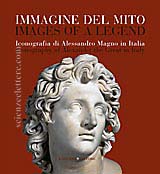Immagine del Mito. Images of a Legend Iconografia di Alessandro Magno in Italia. Iconography of Alexander the Great in Italy - ESAURITO
- Anno: 2006
- Autore/i: Francesca Chiesa, Paola Stirpe, Andrea Paribeni
- Catalogo: Gangemi
- Argomento: Arte
- ISBN: 978-88-492-0967-9
- ISSN:
Facing english text
Formato: 22 x 24 cm
Legatura: Filorefe - Pagine: 224
Contenuto:
Tra storia e letteratura, tra arte, musica e teatro, Alessandro diventa di volta in volta profeta dell’Islam e simbolo cristiano, filosofo e avventuriero, figura di imperatore romano e di basileus bizantino. A partire dal greco Romanzo di Alessandro, del cosiddetto Pseudo Callistene, si sviluppa la doppia catena dei romanzi cortesi e dei romanzi islamici, che portano Alessandro in Etiopia, in Siberia, in Cina, in Malesia: come un crociato libera Gerusalemme, come un novello Saladino libera Aleppo; a Roma illustra il potere dei Papi, a Mosca adorna la sovranità degli czar. Dall’Egitto all’Estremo Oriente, innumerevoli luoghi ricordano un suo un passaggio reale o leggendario: dalla grande Alessandria alla piccola Eskanderia, non più di una collinetta, sulla strada che da Kabul porta verso nord. Il macedone e greco Alessandro, etimologicamente “difensore dell’uomo”, parla nei secoli con voce siriaca, latina, ebraica, persiana, amarica, slava...
In history and literature, art, music and theatre, Alexander is a prophet of Islam, a Christian symbol, a philosopher and adventurer, the image of a Roman emperor and a Byzantine basileus.The Greek Alexander Romance by the so-called Pseudo-Callisthenes started a double chain of courtly novels and Islamic novels that took Alexander to Ethiopia, Siberia, China and Malaysia: as a crusader he freed Jerusalem, like a second Saladin he freed Aleppo; in Rome he represents the power of the Popes, in Moscow he adorns the sovereignty of the Tsars. From Egypt to the Far East, countless places tell of his passing, real or imaginary: from the great city of Alexandria to the small Eskanderia, no much more than a low hill on the road northwards from Kabul. Over the centuries, Alexander, Macedonian and Greek, etymologically “defender of mankind,” speaks Syriac, Latin, Hebrew, Persian, Aramaic, Slav…...



